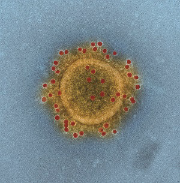Pathogens and transmission
MERS-CoV belongs to Coronaviridae, a large family of viruses responsible for a broad range of disease in humans and animals. In humans these viruses cause conditions ranging from colds to SARS (severe acute respiratory syndrome). MERS-CoV is genetically distinct from the coronavirus that caused the 2003 SARS pandemic. Neither the virus reservoir nor the transmission route has been clearly identified. The dromedary (and products such as unpasteurised milk derived from it) seems to play a key role in the transmission of the virus from animals to humans. Human-to-human transmission takes place through close contact, presumably via droplet infection. Infection often occurs in hospital (nosocomial infection) or in the family.
Symptoms
The incubation period is normally less than a week, but sometimes up to 14 days. The onset of the condition is characterised by the following symptoms: fever, coughing, shivering, muscle pain and respiratory problems (dyspnoea, i.e. laboured breathing). In serious cases it can develop into pneumonia that can lead to lung injury. This may require artificial respiration and admission to intensive care. Gastrointestinal disorders have also been observed, sometimes accompanied by diarrhoea.
Patients already suffering from a chronic condition (diabetes, immunodeficiency, cancer, etc.) have elevated mortality rates. In Saudi Arabia the disease has been fatal in around 35 percent of infected patients. At present there is neither a vaccination nor other specific treatment. Patients are treated symptomatically depending on their state of health.
Distribution and frequency
Since 2012 the WHO has recorded a total of 2,428 confirmed cases of MERS-CoV worldwide, including 838 fatalities.
Autochthonous (locally acquired) cases have so far only been reported in Middle Eastern countries: Saudi Arabia, United Arab Emirates, Iran, Jordan, Kuwait, Lebanon, Oman, Qatar and Yemen. Imported cases (or cases connected with such cases) have been observed in Algeria, Austria, China, Egypt, France, Germany, Greece, Italy, Malaysia, the Netherlands, the Philippines, South Korea, Thailand, Tunisia, Turkey, the UK and the United States.
Most infections have been recorded on the Arabian Peninsula, particularly Saudi Arabia (85 percent of the confirmed cases).
Prevention
Travellers in endemic areas run the risk of being infected. In reality, however, the potential risk depends on possible contact with dromedaries (Arabian camels), their products or patients with the disease in medical establishments. Anyone staying in the countries affected should now avoid contact with sick people and animals (especially dromedaries), and pay attention to hand and food hygiene. In other words, they should wash their hands with soap and water (especially before and after touching animals), avoid eating undercooked meat, and drink milk only when pasteurised.
The FOPH also advises following any further local recommendations.
Travellers who develop symptoms, either while travelling or within 14 days of returning home from an epidemic area, are asked to seek medical advice.
Diagnosis
The reference centre for MERS-CoV is the national reference center for emerging viral infections (CRIVE) in Geneva. Please follow the instructions on the CRIVE website (see link below) and make absolutely sure to notify CRIVE by telephone before sending samples of suspected MERS-CoV.


